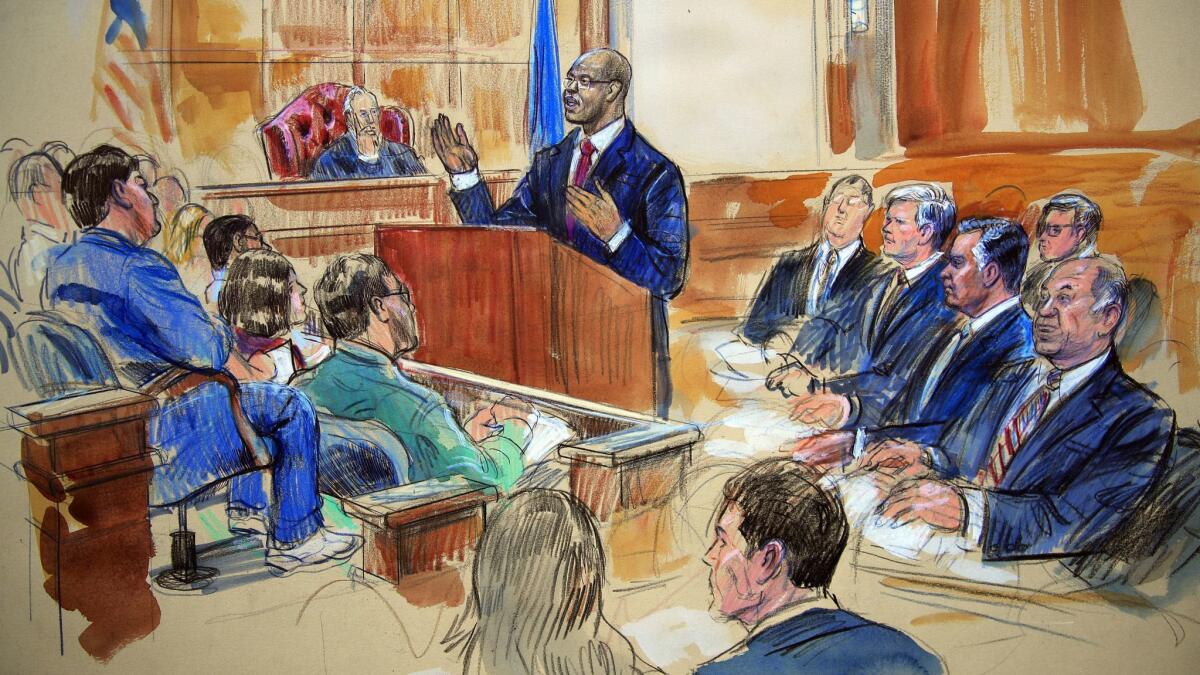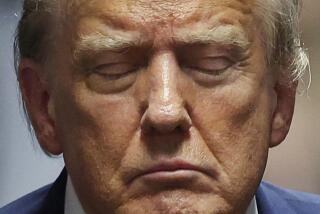Judge is the undisputed center of attention at Paul Manafort’s trial
- Share via
Reporting from Alexandria, Va. — Every big trial has a star — a crusading prosecutor or a slick defense attorney, a red-faced defendant or an emotional witness. For the trial of Paul Manafort, President Trump’s former campaign chairman, it’s none of the above.
As the proceedings enter their second week, the indisputable center of attention so far is the judge, T.S. Ellis III, whose cantankerous, jocular, impatient and verbose presence has shaped each step of the way.
From his high-backed, burgundy leather chair, a wave of thin hair atop his head, Ellis pivots between jokes and rebukes, making him the rare source of theater in a case that has dwelt on dreary financial records and testimony from accountants.
“If I was at a dinner party, I would want to sit next to him,” said James Dana Adams Jr., a 66-year-old retiree who lives near the courthouse and has been attending each day of testimony to soak up the spectacle of the first trial on charges brought by special counsel Robert S. Mueller III.
Prosecutors may not feel the same way. They’re halfway through presenting their case against Manafort for tax evasion, bank fraud and conspiracy, and so far, they’ve borne the brunt of the judge’s wit and criticisms.
The badgering started as soon as the trial began, when Ellis twice interrupted Assistant U.S. Atty. Uzo Asonye, urging him to couch his opening statement in terms of the evidence he planned to present.

Ellis has frequently halted questioning he believes to be imprecise or unnecessary, and has chided prosecutors for lingering on how Manafort spent his millions — a $21,000 watch, a $15,000 jacket made from ostrich — rather than the legal issue of whether he avoided taxes.
When an FBI agent testified about finding invoices for tens of thousands of dollars’ worth of expensive suits, home renovations and flashy cars during a search of Manafort’s condo in Alexandria, Ellis interrupted.
“Enough is enough,” the judge said. “You don’t convict people because they have a lot of money.”
“You can’t pull one over him very easily, and you better be precise in what you say,” said John Zwerling, a defense attorney in Alexandria who has tried dozens of cases before Ellis. “If he thinks you’re going to do that, he’ll jump all over you.”
Ellis isn’t above a self-deprecating remark about his age or his hearing, jokingly asking a witness to speak louder at one point.
“My hearing is not what it once was,” he said. “Nothing is what it once was.”
But as a 78-year-old senior judge appointed to the bench by President Reagan in 1987, he demands lawyers’ respect. On the second day he admonished them for rolling their eyes.
“Rein in your facial expressions!” he snapped.
Ellis carries himself with the confidence of someone who assumes few people know more than him about the law — or any other topic.
He holds an engineering degree from Princeton University and law degrees from Harvard Law School and the University of Oxford. He served in the Navy from 1961 to 1967, then worked in private practice at the Richmond, Va., law firm Hunton & Williams for nearly two decades before Reagan appointed him to the bench in 1987. At the firm, he overlapped with Lewis F. Powell, who was a prominent partner until he was appointed to the Supreme Court in 1971.
High-profile criminal cases have punctuated Ellis’ 31-year career as a federal judge, including the trial of “American Taliban” John Walker Lindh, an American citizen who traveled to Afghanistan to train with Al Qaeda and was captured during the 2001 U.S. invasion. Lindh accepted a plea bargain and Ellis sentenced him to 20 years in prison without parole.
As a senior member of the bench, Ellis seems to take pleasure in schooling attorneys on matters large and small. During a discussion about offshore bank accounts in Cyprus — specifically Nicosia, the largest city on the Mediterranean island — Ellis jumped in to correct Greg Andres, the assistant special counsel.
“I’ve been to Greece, not to Cyprus. But I think they pronounce it Nicosia,” Ellis said, with an emphasis on the “O.”
Later in the day, Asonye articulated the city’s name differently.
“I was wrong?” Ellis said sarcastically. “I don’t know how to pronounce it?”
Asonye apologized and labored to use the judge’s preferred pronunciation for the rest of his remarks.
Follow the latest news of the Trump administration on Essential Washington »
Zwerling said he has seen Ellis — who was born in Colombia and speaks fluent Spanish — correct interpreters on their translations of Spanish-speaking witnesses.
The defense has not been spared. When Kevin Downing, one of Manafort’s attorneys, belatedly rose to object to a prosecutor’s question, Ellis smirked.
“You’re a little slow, aren’t you?” he said.
Slow is definitely not something Ellis approves of. He seems determined to uphold the court’s reputation for having a “rocket docket.”
That has led to clashes at times with prosecutors, who have meticulously walked witnesses through financial records. Are you familiar with what an audit is? What is an audit? Did Mr. Manafort sign the tax return? Can you read for the jury the fine print about perjury?
When Andres asked Ellis if they could take a break after an hour and a half of questioning Manafort’s former bookkeeper, the judge declined.
“No,” he said. “Now is a good time for you to finish.”
He frequently orders “next question,” losing his patience, for example, during testimony from Michael Regolizio, the owner of a landscape company who worked on Manafort’s 10-bedroom home in Bridgehampton, N.Y.
At one point prosecutors’ questions focused on an invoice that appeared to be faked, lingering on the choice of font and the formatting to show the jury how it differed from authentic company documents.
“Just ask him the final question!” Ellis barked. Then turning to Regolizio, he asked, “Is this a document from your business?”
“OK, next question,” Ellis said after Regolizio’s reply.
Ellis has also been sensitive to any issue that could prejudice the jury against Manafort, who worked as a political consultant for Ukraine’s pro-Russia government until 2014, when Viktor Yanukovych was ousted as president.
Prosecutors said he avoided taxes on $15 million in income, and Ellis scolded them for using the term “oligarch” to describe powerful Ukrainians who paid Manafort.
“All we know is they had a lot of money,” he said. “The word oligarch has come to have a pejorative tone.”
The judge’s impatience with lawyers does not prevent him from indulging in his own tangents about his age (he’s never had email and never will), his family (his wife is happier as an English teacher than a lawyer), his grammatical preferences (it’s best not to use split infinitives in front of Ellis) and his decades of experience on the bench.
At one point Ellis apologized to the courtroom after conferring privately with the defense and prosecution.
“The bench conferences have gone on a little long, but I am, at my age, disposed to tell stories, and they had to listen to my stories,” Ellis explained.
The jury has been the frequent audience for the judge’s comedic routine. During the selection process, he assured potential jurors that the experience would not be too traumatic.
“Those who do end up being selected as jurors, I hope you will not hurry to slit your wrists,” Ellis said. “The court will provide you lunches every day.”
“Trials can be very dry, and your mind can start wandering away from the testimony,” Zwerling said. “He breaks it up. I think it’s a technique to keep the jury focused on the trial.”
Ellis allowed the jurors to bring a birthday cake into the courthouse on Friday, but not before doling out another quip.
“You may indeed bring in a birthday cake,” he said. “It’s not my birthday. I quit having those years ago.”
More to Read
Get the L.A. Times Politics newsletter
Deeply reported insights into legislation, politics and policy from Sacramento, Washington and beyond. In your inbox twice per week.
You may occasionally receive promotional content from the Los Angeles Times.











